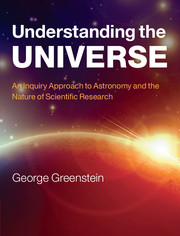Book contents
- Frontmatter
- Contents
- Preface
- Acknowledgments
- Part I Introducing steps to astronomy
- 1 The sky
- 2 The origins of astronomy
- 3 Newton's laws: gravity and orbits
- 4 Light
- 5 The astronomers’ tools: telescopes and space probes
- Part II The Solar System
- Part III Introducing stars
- Part IV Introducing galaxies and the Universe
- Epilog
- Appendix I The small-angle formula
- Appendix II Exponential notation
- Appendix III The Solar System
- Appendix IV The closest and brightest stars
- Appendix V Physical and astronomical constants
- Appendix VI Conversion factors
- Appendix VII Constellation maps
- Glossary
- Figure Credits
- Index
- Plate section
- References
2 - The origins of astronomy
from Part I - Introducing steps to astronomy
Published online by Cambridge University Press: 05 February 2013
- Frontmatter
- Contents
- Preface
- Acknowledgments
- Part I Introducing steps to astronomy
- 1 The sky
- 2 The origins of astronomy
- 3 Newton's laws: gravity and orbits
- 4 Light
- 5 The astronomers’ tools: telescopes and space probes
- Part II The Solar System
- Part III Introducing stars
- Part IV Introducing galaxies and the Universe
- Epilog
- Appendix I The small-angle formula
- Appendix II Exponential notation
- Appendix III The Solar System
- Appendix IV The closest and brightest stars
- Appendix V Physical and astronomical constants
- Appendix VI Conversion factors
- Appendix VII Constellation maps
- Glossary
- Figure Credits
- Index
- Plate section
- References
Summary
As we emphasized in the previous chapter, the Universe is here for everyone to see. Furthermore, regularities in the Universe give hints of a vast cosmic structure in which we all live. In this chapter we will follow the first stages in the historical development of people’s attempts to understand this structure.
Certain primitive societies built monuments whose purpose appears to have been at least partially astronomical. Others built theories. Astrology is one of these theories, now discredited. The ancient Greeks built other theories, and they were among the first to develop mathematical methods of studying the structure of what we now term the Solar System. Their ideas were so powerful as to last for millennia, until overthrown in the scientific revolution. Copernicus, Brahe, Kepler and Galileo are the giants who created our modern idea of science. The final genius, Isaac Newton, was so important as to merit an entire chapter in his own right.
Throughout our historical survey we will make many detours. Indeed, our primary interest in this chapter is not really historical at all. Rather our goal is to garner insights into the nature of astronomy, and indeed into the nature of science in general, as they can be gleaned from a study of its origins.
Ancient astronomy
Astrology
In the previous chapter we considered observations of the sky that you can make with your naked eye. Many ancient peoples made such observations. Indeed, they were often exceedingly careful observers of the sky. The Babylonians and Egyptians, for instance, kept detailed records of celestial events, and they searched these records for regularities.
To some degree these studies were conducted for purposes of prediction. As we have seen in the previous chapter, the month of the year can be determined by observing when the constellations rise. And many important events occur at definite times of the year. The annual flooding of the Nile, for instance, always occurs toward the end of June. But in June, Aquila rises at sunset. So by observing Aquila, trained observers of the sky were able to predict this all-important event.
- Type
- Chapter
- Information
- Understanding the UniverseAn Inquiry Approach to Astronomy and the Nature of Scientific Research, pp. 33 - 62Publisher: Cambridge University PressPrint publication year: 2013



